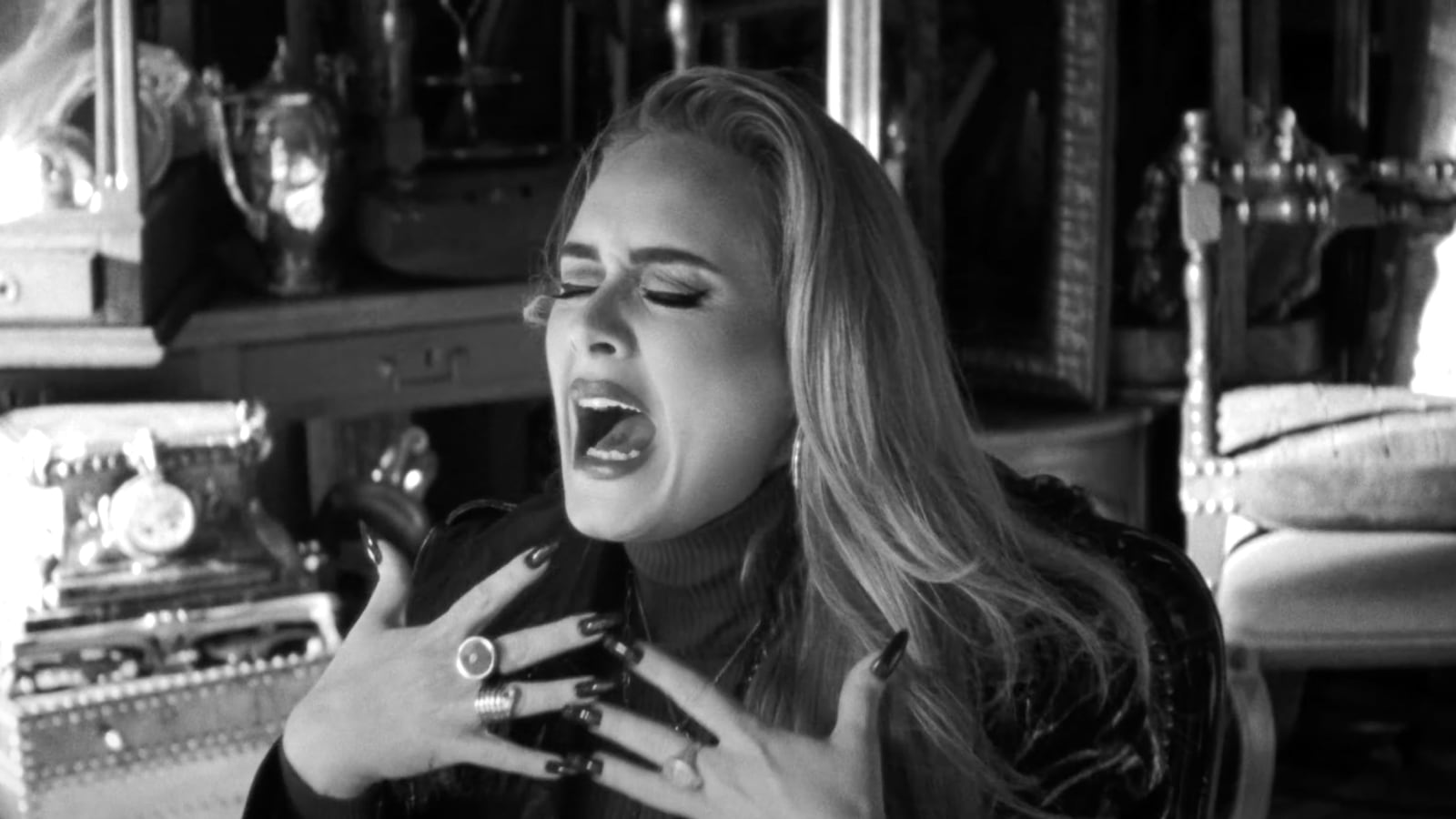This is a preview of our pop culture newsletter The Daily Beast’s Obsessed, written by senior entertainment reporter Kevin Fallon. To receive the full newsletter in your inbox each week, sign up for it here.
It’s odd branding that crying to Adele has become a Super Bowl event.
Adding to the bizarre emotional bloodsport in this case is the source of the anticipation: The singer, one of the most astute translators of the complex tangle of pain that knots around heartbreak and love, has gone through a divorce since her last album.
I wouldn’t go so far as to say that anyone felt that they were owed Adele’s singing filtered through the unspeakable trauma of such a devastating event in a person’s life. But articulating the unspeakable through soaring ballads is Adele’s special talent.
So when her new album 30 was announced, fans started commissioning construction-grade excavators and basically dug nuclear bunkers, bracing for the ensuing atomic holocaust of sadness. Only they weren’t fearful of it; they were desperate for it. Couldn’t wait. Event of the year, this musical devastation. Bring on the tears! Psh… no one was half as excited to hear about my breakup.
The lead single off of 30, “Easy on Me,” was released Thursday evening. The hours beforehand were rife with that emotional doomsday prep. “Here are the notable .GIFs of people crying you’ll want on hand to post.” “Friendly reminder not to text your ex after listening.” “Does anyone know what wine pairs best with weeping while Adele sings?” (Useless question. At this point we’re all experts.)
Yet for all my mocking of the macabre hype, at 7:01 pm ET, when “Easy on Me” appeared on my Spotify, I found myself nervous to press play. It turns out, maybe it was for good reason. The song lived up to that wild build-up… but not for the reasons I think any of us were expecting.
The thing that both surprised and wrecked me about Adele’s “Easy on Me” is that I was expecting a song about diabolical sadness—or, in the grand tradition of divorce music, scorched-earth rage. Instead, it’s a tender plea for empathy rooted in shared love and shared past.
How mature. How unexpected. How incredibly relatable. And how utterly painful to hear.
It’s not about a shitty husband, a revenge mission, or a woman wronged. (For that, might I point you to The Chicks’ Gaslighter and encourage you to go for a jog in a rocket-blast of fury; you may never come back.) It’s about a great love that ended. That experience, especially when set to music—it’s as if someone was shredding a heart like a piece of looseleaf paper. It’s that excruciating, that difficult, that unforgettable for both people involved.
Her voice sounds healthier and more nimble than it has, perhaps, ever. The runs seem more effortless. The trills go up at the end of phrases as if it’s the natural way to punctuate human speech. She calibrates her cannon-ball belt during choruses in such a way that they still boom directly into your psyche and your feelings, but is so controlled that she’s able to, with that voice, contort you through not just her entire relationship story, but, dear God, all of yours, too.
You can feel everything in her singing. One vocal run speaks shattered guilt. The next one is empowerment, confidence in the right decision. One chorus seems just sad, depressed. Another triumphant.
I want you to know that I feel like an absolute crazy person when I write things like that. “One chorus seems…” What utter nonsense! But I am not kidding you. The song, and her voice, is wrangling something so nuanced, and somehow giving acknowledgment to each part.
The accompanying music video is an important part of all this.
It depicts her leaving a cabin in a gorgeous wooded area not unlike the one depicted in “Hello,” fumbling with her phone in a similar fashion. (We’ve graduated from flip to iPhone in this go-round.) She’s driving away from the house and, seemingly, her past life. In another truck is a chair and some sheet music that’s following along. In a flashback that sees her sitting in the chair and belting while the papers fly around her, we can’t help but think of the video for “Rolling in the Deep.”
So, Adele is driving away from her past, but it’s not that simple. She’s also driving down memory lane. They’re sweet memories. The kinds of memories that make the decision all the more upsetting. The memories that you wonder if you could possibly ever make again, or if you’re tarnishing by leaving them now.
But “Easy on Me” isn’t a song about leaving. It’s a song about savoring. Remembering. Preserving.
The memories don’t go just because the relationship does. Neither does the love. The thing she’s asking for in the chorus, for her ex to “go easy on her,” is to come to that place, too. Yet, can anyone make it through the hurt to get to the point where that’s the new truth?
The song is a ballad. A huge one. But at the same time, it’s rather muted, especially in comparison to lead singles like “Hello” or “Rolling in the Deep.” (I think that makes it more interesting.) We’re used to the major explosions in those songs. But with “Easy on Me,” she’s almost like a whirlpool.
Yes, of course her vocals are big and powerful. But they’re drawing us in to herself and what she might be feeling about what she’s gone through—asking to be seen, understood, and perhaps even forgiven. In doing so, she’s reflecting the dare back at us: What if you really confronted your regrets, your mistakes, or the choices you’ve made, even if those decisions were for yourself and didn’t make the people you loved feel good?
Of course, it’s about forgiveness, one of humanity’s most terrifying acts. Bitterness, resentment, and anger is easy, and in some ways comforting. But what happens on the other side of that door? Navigating that reality, the one where the pain exists and has to be really, truly felt so that maybe you can feel whole again is a monstrous task; living with the missing pieces of yourself is almost easier.

Singer Adele smiles with boyfriend Rich Paul during the Game Five of the NBA Finals between the Milwaukee Bucks and the Phoenix Suns at Footprint Center on July 17, 2021, in Phoenix, Arizona.
Ronald Martinez/GettyBut that doesn’t just apply to the other party in this situation. It’s yourself. Can you forgive yourself for those times you misbehaved? You weren’t accepting? You refused to grow? The grudge you held instead of giving grace? When you didn’t show the love that you felt?
“Easy on Me” is so clever—maybe brilliant, even—in that it’s a dialogue. In the context of the song and what we now publicly know about Adele’s divorce (doing simultaneous Vogue covers on both sides of the Atlantic reveals a lot of information), we can assume she’s singing about her decision to end a relationship and asking for understanding from her former spouse.
But in the ways in which she chronicles who she was then and the ways she was meant to grow, experience, or even thrive, she’s attempting to forgive herself—or at least asking to afford herself the same empathy she hopes for from the love she left. It’s perhaps the healthiest song about heartbreak and the dissolution of a relationship I’ve ever heard. Listening to it as a collective population, we’ve all just been to therapy.
So when people on social media are posting histrionically about how devastating, soul-crushing, slide-down-the-shower-door-sobbing drained “Easy on Me” has made them feel, it’s remarkably not in the ways any of us expected. Nonetheless, hand me the Chardonnay and ice cream.







